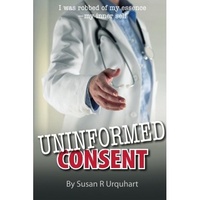Uninformed Consent: Susan Urquhart's journey

Susan Urquhart's book, "Uninformed Consent," is her description of life post-surgery. After having her uterus and ovaries removed by a hysterectomy and a bilateral salpingo oopherectomy (BSO), her life was nothing as she expected.
Her book is a pronouncement about her belief that she was deliberately wronged and her hopes to change the path for other women.
Susan Urquhart has focused her first book around an event which occurred 12 years ago, yet still affects her daily life.
As a perimenopausal woman, she visited her gynecologist to address symptoms of her physical condition. Her doctor encouraged her to have a surgery in which her uterus and her ovaries were removed. She ultimately consented.
There are several elements threaded through this book, but what comes across on every page is the author's tangible anger. As her healing process begins she realizes she was ill-informed of the consequences of her surgery - including permanent side effects, potential side effects for an unknown length of time and how long the healing process would take.
The author speaks openly about post-surgery changes in her sex life, in her emotional life (severe depression ensues), and in her physical life (incontinence and other side effects). She begins to visit a new doctor who she comes to trust.
As she continues to learn more about what has occurred, the author eventually becomes active with the organization Hysterectomy Educational Resources and Services (HERS) Foundation. Through her connections and involvement with this group, she begins to really heal emotionally. This book is one product of her healing process.
Urquhart states very clearly that she believes her gynecologist who performed the surgery is at fault. At one point, she even hopes to take the surgeon to court for what she has done. Perhaps most compelling is the fact that, in reviewing her files, the author discovers the doctor had reserved the surgery room for this operation 2 weeks before consent was given.
Regardless of whether the reader believes the fault lay partially, entirely or not at all with the surgeon, what is clear is there are fundamental differences in attitudes towards surgery by those who practice medicine and those who do not. It is the difference of talking about "the" human body and "my" human body. The result - what goes unsaid or is misunderstood can be devastating indeed.
Healthcare debate is in the daily news and, as people discuss who should be covered, the book serves as a reminder that another essential component of the discussion is to consider another question: What quality of care do recipients receive? "Uninformed Consent" is one person's address to help others receive high-quality and, hopefully, less damaging care as life takes unexpected turns.

